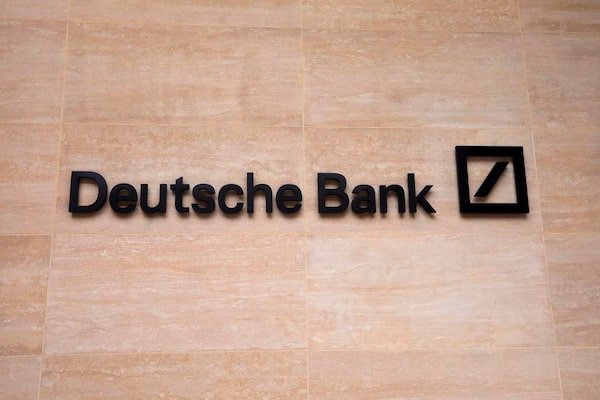
Deutsche Bank releases second-quarter earnings on Wednesday with a US$3.45 billion loss. On the heels of announcing 18,000 layoffs across the globe the financial giant is struggling to realign its business model.The Associated Press
Deutsche Bank AG reported a bigger than forecast quarterly loss of €3.15-billion (US$3.5-billion), underlining the challenges faced by chief executive Christian Sewing as he attempts to turn around the struggling business.
Germany’s largest bank had already flagged it would lose around €2.8-billion in the quarter when it announced a restructuring plan that will see 18,000 jobs go and cost €7.4-billion overall.
The size of the loss, compared with a profit of €401-million a year ago, prompted the bank’s shares to slide as much as 5.8 per cent in Frankfurt before regaining some ground. The bigger loss stemmed from higher goodwill impairment charges than expected when the bank announced its restructuring on July 7.
As it reshapes, the bank expects to post a loss in 2019, meaning that it will have been in the red for four out of the past five years. But it is aiming for profit in 2020.
The bank also anticipates 2019 revenue to be lower than in 2018. That forecast marks a further scaling down in expectations from previous quarters.
Founded in 1870, the bank is considered one of the most important for the global financial system, along with U.S. heavyweights JPMorgan Chase & Co., Bank of America Corp. and Citigroup Inc.
But Deutsche has been plagued by losses and scandal, prompting it to embark on one of the biggest overhauls to an investment bank since the aftermath of the financial crisis.
Mr. Sewing said on Wednesday that the bank had already taken significant steps in implementing the strategy. More than 900 employees had given notice or been told they would be made redundant from a bank that had around 91,500 employees.
In a note to staff, Mr. Sewing said that the lender’s underperforming investment bank faced “strong headwinds” in the quarter, including questions about the bank’s future that spooked clients.
“Now we can look ahead with more optimism,” he wrote.
TALE OF WOE
Deutsche’s troubles peaked with a US$7.2-billion fine in 2017 for its role in the U.S. mortgage market crisis, in a major blow that caused clients to flee.
A new leadership, with Mr. Sewing at the helm since last year, has tried to revive Deutsche’s fortunes, but problems have persisted.
In April, the bank called off nearly six weeks of talks to merge with crosstown rival Commerzbank AG.
It then embarked on a plan for “tough cutbacks” to its investment bank, representing a major retreat from investment banking for Deutsche, which for years had tried to compete as a major force on Wall Street.
Net revenue in the quarter fell 6 per cent to €6.2-billion. Revenue at Deutsche’s cash-cow bond-trading division dropped 4 per cent in the quarter, while equities sales and trading revenue dived 32 per cent.
The declines underscore the continued weakness at the lender’s investment bank, which saw an 18-per-cent drop in net revenues during the period.
“I could make excuses,” about the division’s performance, Mr. Sewing told analysts. But “this simply doesn’t matter. We must do better and we will do better.”
RBC Dominion Securities wrote that Deutsche’s earnings illustrated the “long road until we have visibility on the many stepping stones” to a turnaround.
Among details of the overhaul announced earlier this month, Deutsche said it planned to scrap its global equities business and scale back its investment bank. It also reshuffled management.
The bank will set up a new so-called “bad bank” to wind down unwanted assets, with a value of €74-billion of risk-weighted assets.
Reuters reported on Tuesday that it will take years to shed those unwanted assets, tying up capital that could have generated income of €500-million a year.
Preparations to auction unwanted equity derivatives are “well advanced,” the bank’s finance chief told analysts.
Some investors have said they doubted these moves would be enough to turn around its flagging fortunes in the face of intense competition and low interest rates.
Others investors have said they were worried Deutsche would backtrack on a pledge not to tap shareholders for additional cash, particularly in view of its capital constraints.
“I really can’t say that I see the positives in this plan. I remain a bitter curmudgeon,” said Barrington Pitt Miller, portfolio manager at Janus Henderson Investors.